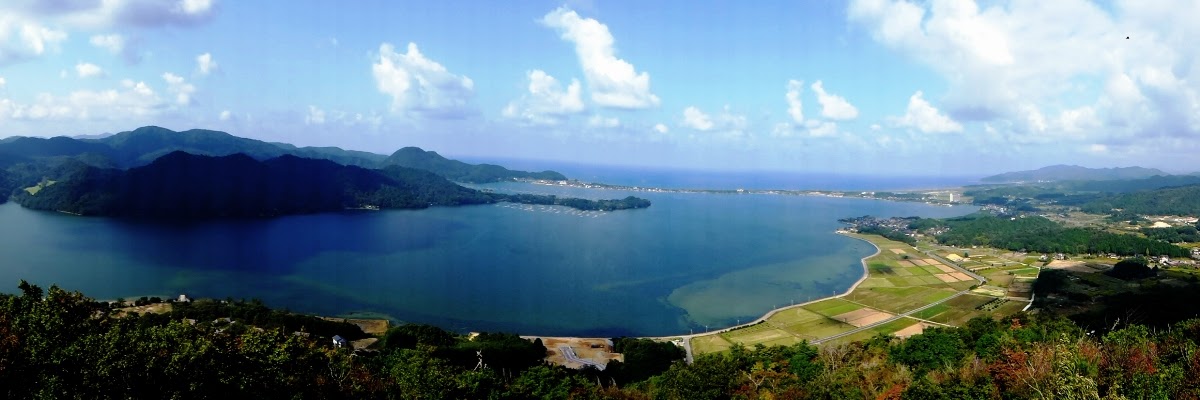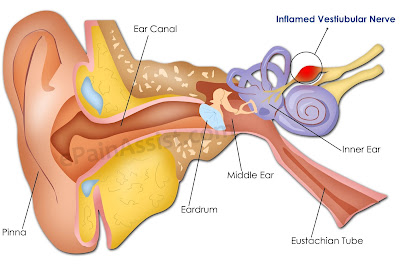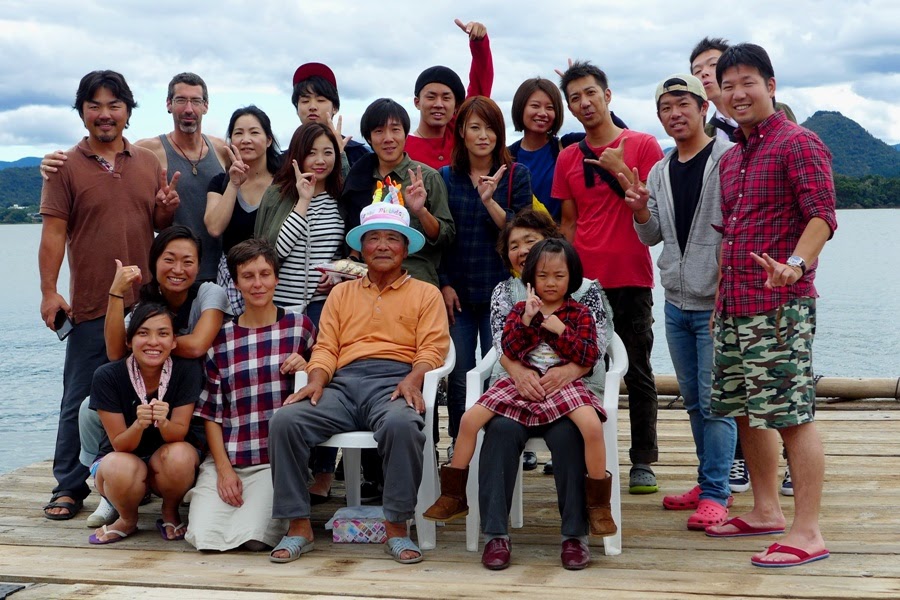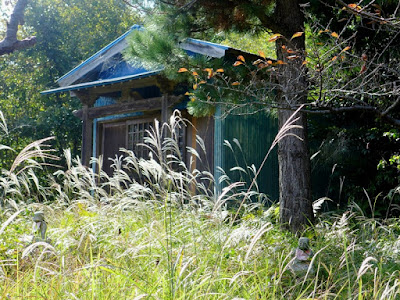It allegedly "means no worries for the rest of your days". Ha ha ha! Let me laugh a bit. Ha ha-Kumihama-tata,
quelle chose fantastique! In case you don't have a clue what we're talking about, it's probably time for you to do the time jump and learn of our previous
Helpx adventures in Kumihama with Atsushi-san and his lovely and loving family.
 |
 |
 |
 |
 |
| an in-pictures summary of our daily life by the Kumihama Bay: a breath-taking environnement and a breath-taking food experience! |
We have a
first episode in Engrrish for you and a
second one in Fwench, well: for you too - so
you get to practice a bit.
Now wepeat aftew us: "mon tailleuw est wiche". Excellent! We pretty much told you everything about the work we did, helpxing an average 5-6 hours per day, in exchange of (luxury) accommodation and (amazingly delicious) full board. Believe it or not, as magnificent as life in Kumihama might be, that's not even the main reason why we spent about a month and a half at Atsushi's, while our plan was to spend 10 to 15 days there! First, it's because Atsushi-san is the nicest, friendliest and most generous person one can dream of: good communicator, straightforward and always positive, he gets out of his way all the time to make sure his guests/helpers are happy and comfortable. We sometimes had to insist to keep working a bit more and he sometimes had to insist so we stopped working at once! True thing.
 |
| the tokonoma in one of the guestrooms, with Oka-san's freshly composed ikebana. |
Then, because Atsushi-san's parents, Oka-san and Oto-san, treated us with gorgeous food, with special
umeboshi recipes to heal and cure all our pains and health issues (we'll talk about that in a moment...) and even with some special bootleg
sake every time they found a decent-enough reason to celebrate. They also let us cook for them and we soon discovered that Atsushi, his wife Naoko-san and daughter Yuzuki-chan had a soft spot with sweets in general and with homemade cakes and cookies in particular! Young Yuzuki-chan was often very enthusiastic to play, cook, eat and practice English with us (the latter being probably not the best way for her to improve her skills, ha ha!). In a word: they all made us feel at home and a part of the family each and every day of our stay and we could never thank them enough for that! When your plan is to do Helpx for a while and you end up meeting (and belonging to) a foster home at the end of the world and you do not want to leave them - thank you Helpx for causing these and also
those! Even good old
Ko-Aru, the family's
inu, adopted us and accepted us as a part of its dog-mestic environment (dog-mestic, ha ha!). On our free time, we could still work on some translations from our remote office, in order to keep paying for part of the whole adventure (making money along the road is an important part of our
un(t)raveling philosophy). We also had time to go "surfing" or walking along the nearby beach, borrow bicycles to ride around the bay or go visit some local touristic attractions, such as the famous dairy farm whose Jersey cows are friendly and produce yummy yogurt and
ice-u-curima: both tested and approved! It was actually on a sunny Sunday, right after visiting the dairy farm, that Futuna started to feel dizzy "again". "Again" because the feeling was pretty much similar to that
experienced in Berlin). "I must be tired" he thought while focusing on riding his bike in a straight line along the road back home - a bicycle trip in the purest "
Mr. Hofmann's style"...
 |
 |
 |
| the famous Tango Jersey farm and its friendly Jersey cows ; a cow'se-up shot ; tasted and approved by two lactose-(hyper)-tolerant cats! |
Half an hour later in the kitchen, as he was cooking some dinner with Wallis, everything started spinning "again". He managed to run to the toilet, railing against the walls and stumbling on every piece of furniture (fortunately, Japanese rooms are generally quite empty), to throw up all he had. It was as though a potent psychedelic drug had just kicked in. Without the fun. From that moment,
woosh!, Futuna vanished from the face of earth during about 4 days. Incapable to stand or sit and to keep any solid food more than 10 minutes, he spent all this time in bed, vomiting in a bucket most of the water and soup Wallis and Oka-san brought him. Ah, he also vomited bilis despite desperately repeating his Epley maneuvers so as to take the inner crystals back in resting position... But nothing seemed to work this time and there was no clue the situation would ever improve. Armed only with her clinical eye and a little help from google, Wallis soon concluded it was NOT the
BBPV diagnosed in Berlin: first, because the
Epley maneuvers were not working; second because the
nystagmus was constant, not increasing upon head movements nor decreasing upon reclining. Bizarre...*
 |
| that's the information we got from the hospital: papers, tickets, vouchers and such... |
She even got an alternative diagnosis:
Vestibular neuritis. Brilliant Wallis! Meanwhile Futuna was stable-ish: throwing his stomach up but with no life-threatening condition. His dehydration was noticeable but not alarming yet and the whole thing would likely improve and disappear after 3 to 5 days of aura. The problem was Atsushi-san and his family got extremely worried. Get in their skin and imagine a couple of strangers coming from very far away and staying at your place. One of them gets sick. Unable to walk, stand or even sit. Spending 2, 3 and 4 days in bed vomiting and moaning, with no reason to believe he's going to get better - and both he and his girlfriend repeating: "It's okay, don't worry. It's gonna be fine. It's just a matter of a few days"... (let alone this particular helper is NOT being helpful at all!)
At some point, they all were seriously worried and we couldn't wait any longer for the situation to improve by itself. We had to accept their polite offer to take Futuna to the hospital. An overall 'fun' experience. Unfortunately, we all were a bit too tense to take pictures, for it would have been really cool to post some here! Emergencies, dispatch nurse, ORL department, 2 hours waiting for an "
engurishu supeakingu docutoru" and finally, we were extremely lucky that our friend Atsushi-san was fluent in English and could translate the doctor's
engurishu into regular English! The specialist lasted about 20 seconds to discard a BPPV (
impossiburu!) after witnessing the nystagmus was constant.
1 point for Wallis! He lasted about 5 extra minutes to conclude it was either a Vestibular neuritis (most likely, because there were no hearing loss:
2 points for Wallis!) or a De Ménière syndrome, which couldn't be discarded because of the current Typhoon: a close correlation between strong atmospheric pressure perturbations and the de Ménière was apparently well described in Japan. So it was either one or the other condition, and the doctor didn't really care which it was since the outcome, prognosis and management were the same: no treatment other than symptomatic for the nausea, no life-threatening risk as long as you didn't try to walk a highline, nothing to do but rest until the crisis ended on its own...
 |
| an ear (outer, middle and inner), with the labyrinth and vestibular nerve on the upper right. |
To the question "How long for complete recovery?", his answer was something like: "
bigu curisisu, okay one weeku ; symputomu fade in few months ; sequelae depend the peoporu: one year, two year, foreveru." And that was it. He invited us to come back in a couple of weeks to repeat the tests and decide whether it was vestibular neuritis or de Ménière. Two weeks later, Wallis would be proved to be right: Vestibular neuritis most probably caused by a benign viral re-circulation (herpes, Epstein-Barr or some stuff like that): a common, usually unnoticed asymptomatic infection, taking advantage of some exhaustion/stress situation and weakened body defenses to get to the vestibular nerve and create a focus of inflammation. The affected nerve can either recover or be lost forever, explaining why people can either get back on their feet after only a few weeks or keep a slight uncomfort and dizziness months after the infection. At some point (up to 18 months!), the brain learns how to compensate the loss and to rebuild proper balance using the other side (the vestibular function that wasn't affected), the sight and proprioception. Over 80 % of all patients report no more sequelae after 18 months. Fair enough and no reason to worry. Just wait, rest... and see. Obviously, it challenged our travel plans including, first and not least, the project to come back from the end of the world by land along the silk road, through China, central Asia and Iran. It was just impossible to say if - and when - Futuna would be able to hike through the Asian winter with a 25+ kg backpack, without falling every 3 steps like a drunkard. The doctor insisted it was better not to fly within a few weeks (changes in pressure are generally very bad for the ears), nor to engage in any tiring activity, and to avoid unnecessary stress. Yeah!
 |
 |  |
| our extended family on Oto-san's birthday (he and Oka-san are in the center) ; the yummy fish barbecue and the garage party we threw that night! |
That meant longer holidays in Japan and later, well, ¡
qué será, será! It took Wallis 4 more days to manage to get Futuna to sit and read books or to just stay on a chair in the sun by the bay. Brave Wallis! And from that moment, things improved pretty fast: walking without stumbling every other step, walking up and down the stairs, standing with his eyes closed and even working on a platform with the rest of the team. After a week, Futuna was back to life and almost 100 % back to normal! Weaker, slower and clumsier than ever, but alive and kicking. Oto-san's special diet of "eat this!", "now eat that!" sure helped this super fast recovery. And that's exactly when Atsushi's brother came with a bunch of friends and colleagues from Fukuoka, to chill over a weekend and celebrate Oto-san's birthday. So, we had a great barbecue night with them all: good time, lovely food, fun conversations - especially about blood types**. We also took 1.000 selfies and FB-friended so as to get in touch and hang out when we'd visit Fukuoka. After Shimon-chan, our agenda for Fukuoka was getting full of promises, ha ha! Lovely Nao-san even offered to give us a proper surfing lesson, but Futuna was not exactly in the mood yet and that would have to wait... With the prudence and pace of a centennial, we kept working another couple of weeks after that, getting back to normal and thinking of options for the rest of our un-travel. Meanwhile, Wallis' mother was randomly seeing a documentary on TV from Barcelona, about a remote and un-touristy Japanese island. She immediately sent us an email, advising us to go see this tiny, beautiful and raw little volcanic wart covered in transitional primary rainforest, home of trees over 3.000 years old. This place, its one-of-its-kind virgin forest and biodiversity were said to have inspired the landscapes of Miyazaki's "
Mononoke hime".
 |
| the small temple/shrine by the pinetree on the hill, and its little shinto cairns. |
At a time when all projects were to be re-designed and all dreams re-dreamt, we put the mysterious island on our bucket list and
insh'Allah, you'll hear more about it within a few weeks! We kept working on the platforms, cooking and having fun together, went to see some
matsuri (traditional festivals, pictures coming...) in the surrounding villages and Oto-san decided, as a farewell treat, to take us on a hike to the summit of the nice little mountain we'd been looking at all this time, just across the bay. We visited the little temple halfway up the gentle slope and took a long while enjoying the beautiful views. The opening picture on this post is from up there! The next morning, after a last breakfast even nicer than the others and a long and emotional round of (western-style) hugs, Atsushi-san and Pei-chan** drove us to the local train station so we could start our long pilgrimage around
Kyotango peninsula and all the way to Amanohashidate, then to Kyoto for the world-famous
Jidai Matsuri. And from there, sounthbound to Kyushu island: Fukuoka, Kumamoto, Kagoshima, Nagasaki and farther... So, that's pretty much it for today, but you can follow us and keep up with our latest adventures!
 |
| last impression matters: Atsushi-san and Pei-chan goodbye as a zombie-attack! |
By the way, did you know you could subscribe to our blog? There's a small box on the right side of the page, at about the height of the friendly cow, where you can enter your email address and get each new post, freshly delivered to your mailbox within 24 hours... Well, now you do, et
voilà: let's take the
wendez-vous and never miss a new release!
Okay, our train is leaving, it's time for us to say goodbye. But not without (once more!!) extending our warmest thanks and sending much love to Atsushi-san and his wonderful family. We are so grateful, happy and honoured that you adopted us, took care of us and shared your daily life in beautiful Kumihama with us! Our home will always be your home, wherever it is and whenever you may come visit us.
Atsushi-san, Naoko-san, Oka-san, Oto-san and Yuzuki-chan, take great care and see you again someday!













No comments :
Post a Comment